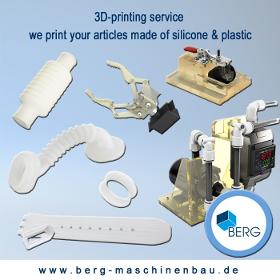- europages
- >
- COMPANIES - SUPPLIERS - SERVICE PROVIDERS
- >
- 3d printers
Results for
3d printers - Import export

SHENZHEN PROMOSTAR HARDWARE CO.,LTD
Germany
custom printer accessories for machining.
Request for a quote
ANDREAS BERG STAHL- UND MASCHINENBAU E.K.
Germany
unprecedented opportunities thanks to newest 3D-print technology: whether ultra-stable up to 103°C/217,4°F heat-resistant plastic parts or elastical silicone up to 65 shore – we can meet your very special needs on a wide range – with a print resolution of up to 15 μm! Realizing ideas quickly: we print your prototypes, devices, models, sales samples, artworks or even final products made of plastics or silicone. For your individual 3d-print, we need your data-model in STEP- or STL-format. We are looking forward to your inquiries!
Request for a quote
IGUS® GMBH
Germany
igus® presents world's first tribological 3D filament for 3D printers. The tribological 3D printing material is up to 50 times more abrasion-resistant than conventional 3D print materials igus® has been researching the 3D printer filament field to provide its customers with even more flexibility. Real useable parts can now be produced for prototyping. At the moment we offer two materials: the highly wear resistant iglidur® I170-PF and the flexible iglidur® I180-PF. igus®' 3D printer material starter kits are now available in weights from 25 g and diameters of 1,75 mm - 3 mm. Typical applications:Prototype construction, small batches, test installations Delivery program: Delivery program: Wear linear: v= 0,1 m/s; p= 1 MPa; l= 5 mm Wear pivoting: v= 0.01 m/s; p= 1 MPa; ß= 60 igus® presents world's first tribological 3D filament for 3D printers. The tribological 3D printing material is up to 50 times more abrasion-resistant than conventional 3D print materials igus® has been researching the 3D printer filament field to provide its customers with even more flexibility. Real useable parts can now be produced for prototyping. At the moment we offer two materials: the highly wear resistant iglidur® I170-PF and the flexible iglidur® I180-PF. igus®' 3D printer material starter kits are now available in weights from 25 g and diameters of 1,75 mm - 3 mm. Typical applications:Prototype construction, small batches, test installations igus® presents the first tribo filament for 3D printers The new 3D printing materials are up to 50 times more abrasion-resistant than conventional 3D print materials. Complete processing instructions for iglidur® I170-PF (PDF) Complete processing instructions for iglidur® I180-PF (PDF) iglidur® |180-PF Hotend temperature: 220 - 250 °C Bed temperature: 90 - 110 °C Excellent wear behaviour Material table Colour white Moisture absorption at 23 °C and 50 %r.h. 0,3 weight-% Max. water absorption 0,9 weight-% Max. long term application temperature +80 °C Max. short term application temperature +90 °C Minimum application temperature -40 °C Delivery program: iglidur® |170-PF Hotend temperature: 220 - 250 °C Bed temperature: 90 - 110 °C Outstanding wear behaviour of the tribo filaments Harder to process Material table Colour yellow Moisture absorption at 23 °C and 50 %r.h. 0,5 weight-% Max. water absorption 1,6 weight-% Max. long term application temperature +75 °C Max. short term application temperature +85 °C Minimum application temperature -40 °C Delivery program: Y = rate of wear [µm/km] * moulded Wear linear: v= 0,1 m/s; p= 1 MPa; l= 5 mm Y = rate of wear [µm/km] * moulded Wear pivoting: v= 0.01 m/s; p= 1 MPa; ß= 60
Request for a quote
FRIEDR. FREEK GMBH
Germany
Flexible silicone heaters are resistant to permanent temperatures up to 200°C, with self-adhesive foil 180°C should not be exceeded. Higher temperatures of 230°C are possible for a short time without destroying the heater. The temperature that will be reached within the application, generally is not easy to predict, as there are many influencing factors. In addition to the power, resp. surface load, this also includes mass and type of the material to be heated (thermal conductivity, surface quality, etc.) installation / assembly situation (bonded, vulcanised, clamped, etc.), ambient temperature, air movement and, of course, the control technology used. Application examples for silicone heater mats include: canteen kitchen technology / catering, anti-fog and anti-freeze applications, tool or plate heating in machines, 3D printers, laboratory equipment, composite materials repair, joint curing and much more.
Request for a quoteDo you sell or make similar products?
Sign up to europages and have your products listed
Results for
3d printers - Import exportNumber of results
4 Products